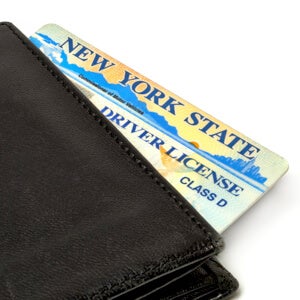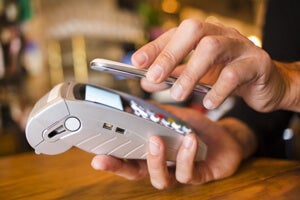There’s now a technology to replace almost everything in your wallet. Your cash, credit cards, and loyalty programs are all on their way to becoming obsolete. Money can now be sent via app, text, e-mail — it can even be sent via Snapchat. But you can’t leave your wallet home just yet. That’s because there is one item that remains largely unchanged: your driver’s license.

If the Iowa Department of Motor Vehicles has its way, that may no longer be the case. According to an article in the Des Moines Register, the agency is in the early stages of developing mobile software for just this purpose. The app would store a resident’s personal information, whatever is already on the physical licenses, and also include a scannable bar code. The plans are for the app to include a two-step verification process including some type of biometric or pin code. At this time, it appears that specific implementation details are still being worked out.
The governments of the United Kingdom and United Arab Emirates had both previously announced their own attempts to experiment with the concept. It’s becoming increasingly common to see mobile versions of other documents. Over 30 states now allow motorists to show electronic proof of insurance. It only follows that the driver’s license would be next. But the considerations around that document are different — it is perhaps the most regulated and important document that a person carries.
At first thought, the idea seems rife with potential security and privacy issues. It is well known at this point that nothing is unhackable; and if a project is made on a government contracting schedule, the likelihood of a breach is only greater. There’s already a contentious legal debate regarding law enforcements’ abilities to search your devices. Everywhere there is growing concern about what else apps, once installed, can be used to collect or carry out in the future.
Questions of security, however, must take into account context — and there, it can be argued that our current regimes of physical documents have been an enormous failure. Having every state choose their own approach for issuing IDs has led to patchwork regulations and glaring weak points in the system that criminals have repeatedly taken advantage of. Driver’s licenses today are regularly forged, stolen, and compromised — it’s far from a secure situation.

There have been major advancements in the technologies that are readily available to consumers. New phones now come standard with features like Near Field Communication (for systems like Apple Pay and Google Wallet), and increasingly, biometric scanners (to use your face or thumbprint to unlock your home screen). In combination with existing practices like using end-to-end encryption, smart cards, and PIN codes, a technological solution may be feasible, theoretically. How these systems perform in real world conditions, on this scale, remains to be seen.
Chris Wiesinger, President of Trace Intercept, a consultancy focused on issues related to digital identity, sees the upside to adopting new technologies as far greater than the potential risks. Wiesinger argues that we are “awash in a world of credentials.” It’s become far too much for individuals to properly manage. He explains that with the inclusion of systems like Apple’s Touch ID, there is a unique opportunity to leverage a new security infrastructure, “I believe all the technologies to make this a high-security operation are already in play, and just need to be orchestrated effectively.”
Having viable digital counterparts to the physical documents and cards we use will allow us to lessen the severity of issues like fraud. But Wiesinger believes that the larger issue that needs to be addressed is the way we approach identity as a whole. What he is advocating for is a larger change in empowering individuals to gain agency over what personal information and attributes are shared, and in what context. Digital driver’s licenses, as well as all the other credentials, could play an important role in making this ecosystem possible.
In Iowa, the success of their pilot study will likely depend more on issues of policy and execution than technological performance. Current plans allow for digital driver’s licenses to be used at airports — it would be wise to restrict security-related use cases till the implementation is much farther along. The state should work with the private sector to start by letting residents use their digital licenses for low-level transactions like verifying age with alcohol and checking into a hotel. It is still too soon to allow a digital license the same authority as the physical one. Although, that day may come down the line.
Some have argued that this discussion will soon become irrelevant because of the amount that is already known about us. When our objects, devices, and institutions know not just who we are, but extremely specific details of our behaviors, the function of a legal identification document becomes unnecessary. It’s true that we are quickly losing our ability to choose when and by whom we are identified.
Despite that, it is unlikely that we will ever see physical documents completely replaced. Throughout history identification documents have been used to signify recognition. A paper document is proof of your existence in the world, it’s an acknowledgement by the government that you have legal rights. There are few forms of control as powerful as the ability to issue or confiscate someone’s identification paperwork. For that reason, don’t expect physical documents to ever go away — their symbolic value will exist long past their day-to-day utility.
Image Credit: Shutterstock.com



